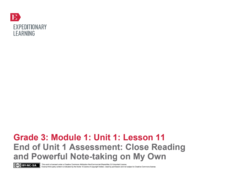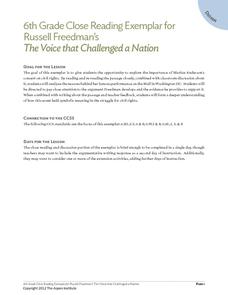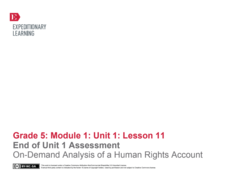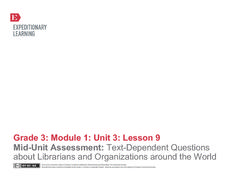EngageNY
Reading Proficiently and Independently: The Power of Setting Goals
Scholars reflect upon their reading strengths and challenges to create personal reading goals. Participants use goal-setting verbiage in an accordion-style graphic organizer, a first step in writing a letter that details their reading...
EngageNY
Close Reading of Thank You, Mr. Falker: Identifying the Superpowers of Reading
Third graders read excepts from the story, Thank You, Mr. Falker in order to gain practice in understanding an unfamiliar story by focusing on the details. They use a worksheet, embedded in the plan, which directs them to certain...
EngageNY
End of Unit 1 Assessment: Close Reading and Powerful Note-Taking on My Own
As the final lesson plan in a larger beginning-of-the-year unit to establish routines and teach close reading skills, this plan is designed as an assessment piece. Using the story, The Librarian of Basra, learners independently...
EngageNY
Close Reading of The Boy Who Loved Words: How Do People Build Their Word Power?
Third graders practice the skills of identifying the main message in a story, describing the main character, and sorting the key details of a story into specific categories. The story they read is, The Boy Who Loved Words. Using a...
EngageNY
Close Reading of Bullfrog at Magnolia Circle: Predators and Prey
Reading is fantastic, especially when it's reading about bullfrogs. Kids get cozy with predator/prey relationships as they hone their information-reading skills. They start out as they read a portion of the text aloud, then they...
National Endowment for the Humanities
Close Reading Worksheet
A passage from Edith Wharton's Ethan Frome provides the text for an assessment that asks readers to use evidence from the excerpt to decide if Ethan is a victim of his social and physical environment, or of his own personal choices and...
Student Handouts
Logical Fallacies
Help your learners grow their critical thinking and analytical skills by asking them to examine logical fallacies. After reading an example, pupils determine if two sets of premises and conclusions are logical fallacies or not and...
Jackson Public Schools
Summer Reading Activities
Provide parents with the tools they need to bridge the summer learning gap with this collection of fun activities. Whether it's creating an alphabet poster with illustrations for each letter, playing a game of sight word concentration,...
Curated OER
Stately Statements
Students closely read President Bush's State of the Union address, then develop interviews and write articles to assess a variety of points of view about The proposals offered in the speech.
Pearson
Performance-Based Assessment Practice Test (Grade 7 ELA/Literacy)
Give your class a taste of the Common Core with a practice test that includes both literary and informational reading passages. Pupils respond to related multiple choice questions and longer written response questions. See the...
Achieve3000
Discriminating Phonemes
Develop the fluency of beginning readers one sound at a time with this phonemic awareness instructional activity. Through a series of whole-class instruction, independent practice, and collaborative learning activities,...
EngageNY
Documenting Research: Sorting and Recording Information About the Wheelwright
Fourth graders practice using a graphic organizer to record their notes and answer text-dependent questions while supplying evidence of how they found their answer. They focus on a machine called the wheelright, which was commonly...
Aspen Institute
The Voice That Challenged a Nation
Included here are step-by-step instructions for conducting a close reading of The Voice That Challenged a Nation by Russell Freedman. After an individual and class reading, class members read carefully through the text excerpt,...
Great Schools
Different Types of Writing
What type of writing is this? Learners read a brief introduction to various types of text: instructions, explanations, poems, folk tales, novels, informative, and arguments. The introduction doesn't explain these, so...
New York State Education Department
TASC Transition Curriculum: Workshop 5
Are video games sports? Pupils investigate this question as well as various nonfiction selections to learn more about claims and the support that defines them. All of the selections mimic the rigor on state tests and encourage close...
EngageNY
End of Unit 1 Assessment: On-Demand Analysis of a Human Rights Account
The last instructional activity in this unit about human rights consists of a final assessment. To demonstrate the skills your class has acquired throughout this unit, they will work with a new article entitled "From Kosovo to the United...
Read Works
How to Say “I Ruff You”
Who says you need a human to be your valentine on Valentine's Day? Give your dog-loving readers an inspiring perspective on how a sister givdes her brother a valentine from the family dog. They then answer 10 questions thatd involve...
EngageNY
Mid-Unit Assessment: Answering Text-Dependent Questions About Librarians and Organizations Around the World
This is a skills-based assessment that asks test takers to use textual evidence to determine the main idea of an excerpt from an informational text as well as respond to text-dependent questions. The assessment is the middle point...
EngageNY
Summarizing Complex Ideas: Comparing the Original UDHR and the "Plain Language" Version
The eighth lesson plan in this series continues the focus on vocabulary and increasing young readers' awareness of academic language. Pairs of learners participate in a short vocabulary review activity called Interactive Words in which...
Roy Rosenzweig Center for History and New Media
Analyzing Political Campaign Commercials
Imagine a lesson that models for learners how to separate facts from opinions. How to detect bias. How to evaluate a source of information. How to identify propaganda. Although designed for middle schoolers, the activities in this packet...
Curated OER
No Regrets: a Poetry Analysis
Students read a poem and use the TPCASTT strategy for analysis. In this poetry analysis lesson, students journal about their future goals and read John Updike's "Ex-Basketball Player." Students discuss the purpose of the poem and...
Curated OER
The Elements of Poetry
Ninth graders explore the elements in poetry. In groups, they complete a jigsaw puzzle and discover the strategies for completing a puzzle and reading a poem are similar. Students read short poems and identify key elements in a poem...
Curated OER
Orienteering
Students study navigation skills when a compass is unavailable. They are timed as they move quickly through a predetermined arrangement of numbered traffic cones . They straddle over the cone and read the bearing found on the record...
Curated OER
Shhhhhhh! The sheep are sleeping!
Students examine the use of /sh/ in written and spoken words by watching how their mouth moves while making the sound, identifying words, listening to a story, and making words with Elkonin letterboxes. As an assessment, they complete a...























